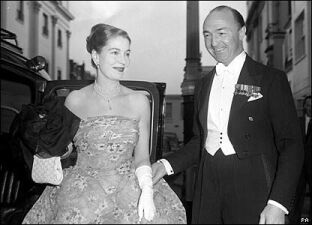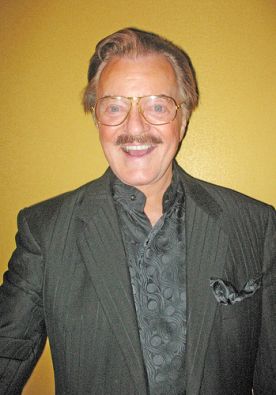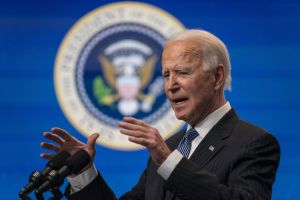A Plague of Scandals
From The New CriterionProfumo and wife, Valerie Hobson, in happier days
In its early report on the death of John Profumo, the Conservative War Minister whose liaison with Christine Keeler — who was also sleeping with a Russian intelligence officer — rocked British politics in 1963, the Times of London noted that at first the press had not played up the story. “With a discretion that now seems astonishing,” wrote Jenny Bootha and Simon Freeman, “the newspapers to whom Ms Keeler sold her story held back from publishing details.” It was a reminder of how much scandal itself has changed in the last 43 years. So, in a different way, was the New York Times’s headline to an Associated Press story about Profumo’s passing: “John Profumo, Scandal-Plagued Briton, dies at 91.” Why do I think there’s something wrong, something anachronistic about that epithet? Profumo wasn’t a scandal-plagued Briton. Back in those days you were either involved in a scandal or you weren’t, but you couldn’t be “scandal-plagued” in the way that the Republican party and President Bush — and, indeed, perhaps all American presidents — now are. They are “scandal-plagued” because whatever they may have done or not done, they are victims of our new media culture and its need to meet the demand for scandal with repeated and often far-fetched attempts to find something scandalous about them.
As a result, when something genuinely scandalous comes along, like the Abramoff affair, it tends to get lost in the shuffle. Concurrently with the news of Jack Abramoff’s bribes to congressmen — which the Democrats have been desperate to link to the Bush White House — over the last couple of months we have had seemingly dozens of other would-be scandals popping up almost daily in the media. These include not only the continuing news of the Libby-Plame, the NSA eavesdropping, and Tom Delay scandals, but also such fresh scandal-meat as the conviction of Congressman Randy, “Duke” Cunningham for accepting bribes, Vice President Cheney’s hunting accident and the delay in informing the media about it and the aborted Dubai Ports deal. In addition some old favorites like the mishandling of relief efforts after Hurricane Katrina last September and faulty intelligence and planning in the run-up to war in Iraq seemed to get a new lease of life from supposedly shocking revelations by insiders with a story to tell. The new Katrina story was particularly instructive because a number of commentators leapt at the scent of scandal in a tape recording of Max Mayfield of the National Hurricane Center’s warning on August 28th last year of concerns that the levees protecting New Orleans could be “topped.” This was taken by Chris Matthews and others of the president’s detractors to mean that when, four days later, he said “I don’t think anybody anticipated the breach of the levees” he was lying.
But as the ever-admirable Media Research Center of Alexandria, Virginia pointed out, the threat of water flowing over the tops of the levees and that of their being breached were not the same thing at all. Moreover, there was also a tape of Kathleen Blanco, the governor of Louisiana, telling Mr Bush the next day that the levees had not been breached. It is hard not to conclude that a number of those who have been taking it for granted for years that “Bush lied” in order to take his country into war in Iraq are predisposed to find further evidence of his mendacity even where it does not exist. That’s what it means to be “scandal-plagued.” The kind of restraint that once kept the press from sensationalizing Christine Keeler’s story has vanished along with the trust to which a nation’s democratically elected leaders were once thought to be presumptively entitled. Partly this is a result of the media’s own politics, and so Republican presidents may expect to be more scandal-plagued than Democrats. But the Democrats, should they regain a share of power in this year’s mid-term elections, may well find that they are scandal-plagued too. The market for serious news is shrinking and scandal-mongering along with the bloggers and partisan news outlets may appear to the more respectable media as the only way to bring it back.
On the demand side, the collapse of political ideologies have left partisans on both sides with nothing to contend about but charges of incompetence or personal wrong-doing, which tend to appear as opportunistic as those surrounding the acquistion of a British company, which now manages commercial port operations in New York, Newark, Philadelphia, Baltimore, Miami and New Orleans, by an Arab-owned company, Dubai Ports World, based in the United Arab Emirates. Most serious commentators on the matter were as firmly persuaded of the harmlessness of the takeover for American security as the Bush administration officials who didn’t think their decision to allow it was worth bothering the president himself about. But the willingness of a few on both the right and the left to encourage a growing American paranoia about even the most pro-Western Arabs proved an irresistible temptation to the Democrats to get to the right of the Republicans on a question of national security. The Republican leadership in the House of Representatives, with an eye on the elections only nine months away promptly panicked at the prospect of having their flank turned and mounted their own rebellion against the White House, which admirably stood by the decision and what it described as the staunch support of the UAE in the War on Terror.
Well, of course both sides had read the polls which suggested that 70 per cent of Americans were against the deal — 53 per cent of them “strongly” so. And the Republicans had the more reason to be terrified of an electoral stampede because they knew they would get little help from the media in damping down the hysteria. Some were doubtless also familiar with the polls which found that 46 per cent of Americans had an unfavorable opinion of Islam generally (up from 24 per cent in January of 2002) and that 32 per cent thought that Islam encouraged violence and terrorism (up from 14 per cent in January of 2002). Meanwhile, those who might otherwise have been ashamed to have been caught in so obvious an exercise in pandering to the prejudices of the electorate could always take the line of the New York Times editorialist and practically ignore the question of the Arab security peril while finding in the administration’s decision-making processes matter for the usual sorts of grave concern. True, the Times grudgingly admitted, “at this point there is little hard evidence that Dubai Ports World is especially vulnerable to infiltration by terrorists or lax on security.” But, of course,
that doesn’t mean Congress is being irrational in wanting a closer look. The deal was approved by an obscure committee of second-level officials. The committee is headed by a Treasury official whose department focuses on promoting trade rather than on security requirements. When concerns were raised, they were never flagged for higher-ups. And the committee itself may never have been warned that the Coast Guard was initially worried that gaps in intelligence made it impossible to assess the potential threat of terrorist operations through the Dubai company. There are also unverified reports of other misgivings among committee members that were somehow ironed out behind the scenes. If the new review does nothing else, it needs to inject greater transparency into this whole process.
It’s not exactly a courageous stand for a newspaper to call for greater transparency in government while unable to come up with anything more than an “initially worried” Coast Guard and “unverified reports” of now “ironed-out” misgivings to suggest that there was anything to be transparent about. Sometimes things get approved by obscure committees of second-level officials because there are so few reasons not to approve them that prominent committees of first-level officials are unnecessary.
Interestingly, though a majority of Americans were “strongly opposed” to the ports deal, a near-majority (49 per cent), according to an ABC News/Washington Post poll, also thought that the politicians who opposed it were “mainly concerned about using the issue for political advantage.” To some extent this is one of those “How smart are you?” questions that are always likely to produce dubious results. Anytime you ask someone who doesn’t know a lot about a thing himself if there is a hidden motive operating beneath the surface which might be detectable by the clever though it be invisible to the naïve you are pretty clearly leading him in the direction of an affirmative answer. Yet neither does this rule out the possibility that even most of those who are being pandered to, and who presumably want to be pandered to, also know that they are being pandered to and rather despise the panderers — as they have done at least since the first Pandarus appeared in Boccaccio and Chaucer more than six hundred years ago.
A poll result that I found even more fascinating turned up on a Fox News/Opinion Dynamics poll in answer to the question: “Do you think that you, personally, would be doing a better or worse job as president than George W. Bush is doing?” The President’s approval rating on the same poll, taken at the end of February and beginning of March, was 39 per cent, while 37 per cent thought that, in his position, they would be doing a better job. If you add in the respondents who said “the same” or “no difference” — always a popular choice among the faint-hearted but when it comes to questions that hint of partisanship — the total of those who thought they could do as well or better than their president at governing the country also stood at nearly half, or 47 per cent.
You might think that a question like that would bring a person up short. All of us who follow politics and who have strong opinions about it spend most of the time we devote to thinking or writing about the subject simply assuming that we could do a better job than the people we are thinking or writing about. Certainly, the very act of writing implies a judgment — and therefore a right and a competence to judge. But at some level we also know — or ought to know — that this is a dream world, existing only inside our heads. Not only have those whom we judge been put into the dock by us, but their defense, such as it is, has also been conducted by us. We are judge, jury and executioner, not to mention arresting officer, principal witness and the attorneys for both the prosecution and the defense. If someone asks us, “So you think you could do better?” the only decent response is “No, I wouldn’t presume.”
This isn’t just politeness or false modesty. It means that we recognize the limitations of the process by which our opinions have been arrived it, and their insulation from the real-world pressures that are constantly bending and shaping the decision-making of those who exercise actual power and responsibility. It doesn’t mean that we don’t still think we’re right and the guys — or, as it may be, gals — in power are wrong; it means we respect the difficulties the guys in power labor under and we, to put it bluntly, don’t. The Fox poll question could be re-phrased in this way: Do you think that the leaders of the country are decent people, acting in good faith to do the best they can with a fiendishly difficult job? The Fox poll revealed that ever-increasing numbers of us no longer believe that. Moreover, what we do believe is not just that the leaders are not decent, not acting in good faith and woefully incompetent but that, so far from being fiendishly difficult, the job is so ridiculously easy that you would have to be a moron to screw it up.
This is the subtext of the Comedy Central, Jon Stewart approach to politics. The laughter that Mr Stewart elicits by raising an eyebrow or judiciously pausing before reeling off a one-liner amounts to an endorsement of the view that governing the country is a piece of cake and that President Bush is the “moron” that it took to screw it up — as even many mainstream journalists and respectable pundits are now willing to say. Richard Cohen of The Washington Post is even more sweeping and includes the Democrats in the moronic category as well. “This country has a bunch of fools for leaders,” he writes. In other words, “Compared to me, everybody with any power in America is a fool.” How big a fool do you have to be to believe something like that? Not only thou and I but anybody — or anybody who isn’t a halfwit himself — could do the job better. Reduce the proposition to that formulation and it becomes self-discrediting, and yet fewer and fewer of us ever do so reduce it. We like too much the effortless superiority of the sneering Mr Stewart, who doesn’t need to argue or even to know anything to issue that seductive invitation to join him in the exclusive circle of those who are entitled to assume that they know better.
The media are obviously well-practised at the same game, though they generally prefer to believe that the country’s leaders are knaves rather than fools. There’s more entertainment value in the Stewartian pose of effortless superiority, but more honor for the media if they are able to cast themselves in the role of Inspector Javert, remorselessly exposing and hunting down anything that could conceivably be portrayed as wrong-doing on the part of our elected officials — even if it’s only the failure to notify the media themselves in what the media themselves take to be a timely fashion of the Vice President’s shooting accident in Texas. The fact that the White House press corps, in particular, couldn’t see how utterly unlike a scandal that particular would-be scandal appeared to the rest of the world — and polling throughout the week that it dominated the news showed that attitudes to Mr Cheney moved not a jot — was a good indication of how far gone they are in the kind of malevolent self-righteousness and self-absorption that seems to make journalists so unpopular with their fellow citizens. This was nicely summed up by one reporter who asked the White House spokesman, Scott McClellan, if it would have been worse of the Vice-President’s victim had died.
The media’s unpopularity was noticed even by the New York Times, which ran a long piece by Katherine Q. Seelye towards the end of February, after the Cheney incident had become nothing but a continuing source of jokes for late-night comedians, including Mr Stewart. “That image of reporters yelling at a press secretary and demanding answers to repeated questions works against them,” as Donald A. Ritchie, author of a book about the Washington press corps, told Ms Seelye. “They reinforce the public’s negative view of them, he said, which in turn plays into the hands of the administration because now reporters, not the original subject that had them agitated, become the news.” She went on to quote her Times colleague, David E. Sanger, as saying that “This is the punching-bag beat of American journalism . . . And the White House itself has been skillful at diverting tough questions by changing the subject to its battles with the media.”
Likewise, after the affair of Vice President Cheney’s misdirected birdshot, David Gregory of NBC News, who had called Mr McClellan a “jerk” for suggesting that he, Mr Gregory, might be grandstanding for the cameras and subsequently apologized for it — does this mean that he was admitting to grandstanding? — qualified his apology as follows:
There is a desire by some, particularly on the right, to morph these situations into a different kind of debate — it’s the vice president against an angry, left-wing, cynical, hate-filled press corps that wants to expose him as a liar. . .This is a false debate, stoked by a president and vice president who have made no bones about the fact that they don’t have much respect for the press corps as an institution.”
Always, it seems, when the behavior of the press comes into question, it can only be a diversion from the “real issues” of the administration’s malfeasance. And yet there is considerable evidence that a great many people otherwise unconnected with the administration don’t have much respect for the press corps as an institution either. In fact, the administration’s battles with the media are not a diversion but the main event in American politics today. Usually, nobody takes much notice of anything the Democrats, the official opposition, have to say until election time, and the debating chambers of the Capitol have long ceased to house anything much in the way of debates. In the absence of any more constitutional center of controversy, the White House press room has become the only parliament that matters to the media, which increasingly means the only one that matters at all.
In its obituary of Profumo, The New York Times wrote of his long-ago scandal without apparent irony that “For a land that has since become renowned for ministerial misbehavior, the 1963 imbroglio set a standard, and became known in newspaper headlines as the scandal of the century.” Is Britain “renowned for ministerial misbehavior”? Well, it’s certainly true that there have been other scandals, even other sex scandals in political life there, most recently that of David Blunkett and Kimberly Fortier (see “Honor Enduring” in The New Criterion of January, 2005). But of course being “renowned” (a telling misuse of the word) for ministerial misbehavior is merely a function of freedom of the press. Those with a smattering of worldly wisdom will understand that ministerial misbehavior is far more frequent in, say, Russia or China or Zimbabwe than in Britain, but that neither “renown” nor notoriety accompanies such misbehavior because the scandal-hunting media prefer to confine their investigations to countries where they’re less likely to result in imprisonment and torture.
And then “scandal of the century”? What a laugh that turns out to have been, given the floodgates of scandal that were opened subsequently and partly as a result of its effecting what the London Evening Standard called in its obituary of Profumo “the death of respect for the establishment.” Yet there is also a sense in which it was the last scandal, rather than the first, for it was the last scandal in which anyone suffered disgrace and received it like disgrace. Profumo to the end of his long life — he was 91 when he died — refused all opportunities for self-justification, buried himself in obscurity and good works among the poor and emerged years later with a CBE and the accolade of “one of our national heroes” from Lady Thatcher. Now there is a scandal that was a scandal. What passes for scandal nowadays is mostly just the media strutting and sneering like Jon Stewart and telling us how much better a job they would be doing than our elected officials. Fortunately, they are unlikely ever to have — or to want — the opportunity to prove it.
Discover more from James Bowman
Subscribe to get the latest posts to your email.






